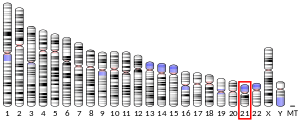STCH
| HSPA13 | |||||||||||||||||||||||||
|---|---|---|---|---|---|---|---|---|---|---|---|---|---|---|---|---|---|---|---|---|---|---|---|---|---|
| Identifiers | |||||||||||||||||||||||||
| Aliases | HSPA13, STCH, heat shock protein family A (Hsp70) member 13 | ||||||||||||||||||||||||
| External IDs | MGI: 1309463 HomoloGene: 5062 GeneCards: HSPA13 | ||||||||||||||||||||||||
| |||||||||||||||||||||||||
| |||||||||||||||||||||||||
| |||||||||||||||||||||||||
| Orthologs | |||||||||||||||||||||||||
| Species | Human | Mouse | |||||||||||||||||||||||
| Entrez | |||||||||||||||||||||||||
| Ensembl | |||||||||||||||||||||||||
| UniProt | |||||||||||||||||||||||||
| RefSeq (mRNA) | |||||||||||||||||||||||||
| RefSeq (protein) | |||||||||||||||||||||||||
| Location (UCSC) | Chr 21: 14.37 – 14.38 Mb | Chr 16: 75.75 – 75.77 Mb | |||||||||||||||||||||||
| PubMed search | [3] | [4] | |||||||||||||||||||||||
| Wikidata | |||||||||||||||||||||||||
| |||||||||||||||||||||||||
Heat shock 70 kDa protein 13 is a protein that in humans is encoded by the HSPA13 gene.[5][6]
The protein encoded by this gene is a member of the heat shock protein 70 family and is found associated with microsomes. Members of this protein family play a role in the processing of cytosolic and secretory proteins, as well as in the removal of denatured or incorrectly folded proteins. The encoded protein contains an ATPase domain and has been shown to associate with a ubiquitin-like protein.[6]
References
- 1 2 3 GRCh38: Ensembl release 89: ENSG00000155304 - Ensembl, May 2017
- 1 2 3 GRCm38: Ensembl release 89: ENSMUSG00000032932 - Ensembl, May 2017
- ↑ "Human PubMed Reference:".
- ↑ "Mouse PubMed Reference:".
- ↑ Brodsky G, Otterson GA, Parry BB, Hart I, Patterson D, Kaye FJ (Feb 1997). "Localization of STCH to human chromosome 21q11.1". Genomics. 30 (3): 627–8. doi:10.1006/geno.1995.1291. PMID 8825657.
- 1 2 "Entrez Gene: STCH stress 70 protein chaperone, microsome-associated, 60kDa".
Further reading
- Maruyama K, Sugano S (1994). "Oligo-capping: a simple method to replace the cap structure of eukaryotic mRNAs with oligoribonucleotides". Gene. 138 (1–2): 171–4. doi:10.1016/0378-1119(94)90802-8. PMID 8125298.
- Otterson GA, Flynn GC, Kratzke RA, et al. (1994). "Stch encodes the 'ATPase core' of a microsomal stress 70 protein". EMBO J. 13 (5): 1216–25. PMC 394931. PMID 8131751.
- Bonaldo MF, Lennon G, Soares MB (1997). "Normalization and subtraction: two approaches to facilitate gene discovery". Genome Res. 6 (9): 791–806. doi:10.1101/gr.6.9.791. PMID 8889548.
- Hillier LD, Lennon G, Becker M, et al. (1997). "Generation and analysis of 280,000 human expressed sequence tags". Genome Res. 6 (9): 807–28. doi:10.1101/gr.6.9.807. PMID 8889549.
- Suzuki Y, Yoshitomo-Nakagawa K, Maruyama K, et al. (1997). "Construction and characterization of a full length-enriched and a 5'-end-enriched cDNA library". Gene. 200 (1–2): 149–56. doi:10.1016/S0378-1119(97)00411-3. PMID 9373149.
- Kaye FJ, Modi S, Ivanovska I, et al. (2000). "A family of ubiquitin-like proteins binds the ATPase domain of Hsp70-like Stch". FEBS Lett. 467 (2–3): 348–55. doi:10.1016/S0014-5793(00)01135-2. PMID 10675567.
- Hattori M, Fujiyama A, Taylor TD, et al. (2000). "The DNA sequence of human chromosome 21". Nature. 405 (6784): 311–9. doi:10.1038/35012518. PMID 10830953.
- Wistow G, Bernstein SL, Wyatt MK, et al. (2002). "Expressed sequence tag analysis of human RPE/choroid for the NEIBank Project: over 6000 non-redundant transcripts, novel genes and splice variants". Mol. Vis. 8: 205–20. PMID 12107410.
- Strausberg RL, Feingold EA, Grouse LH, et al. (2003). "Generation and initial analysis of more than 15,000 full-length human and mouse cDNA sequences". Proc. Natl. Acad. Sci. U.S.A. 99 (26): 16899–903. doi:10.1073/pnas.242603899. PMC 139241. PMID 12477932.
- Ota T, Suzuki Y, Nishikawa T, et al. (2004). "Complete sequencing and characterization of 21,243 full-length human cDNAs". Nat. Genet. 36 (1): 40–5. doi:10.1038/ng1285. PMID 14702039.
- Gerhard DS, Wagner L, Feingold EA, et al. (2004). "The status, quality, and expansion of the NIH full-length cDNA project: the Mammalian Gene Collection (MGC)". Genome Res. 14 (10B): 2121–7. doi:10.1101/gr.2596504. PMC 528928. PMID 15489334.
- Aoki M, Yamamoto K, Ohyama S, et al. (2005). "A genetic variant in the gene encoding the stress70 protein chaperone family member STCH is associated with gastric cancer in the Japanese population". Biochem. Biophys. Res. Commun. 335 (2): 566–74. doi:10.1016/j.bbrc.2005.07.110. PMID 16087163.
- Rual JF, Venkatesan K, Hao T, et al. (2005). "Towards a proteome-scale map of the human protein-protein interaction network". Nature. 437 (7062): 1173–8. doi:10.1038/nature04209. PMID 16189514.
This article is issued from
Wikipedia.
The text is licensed under Creative Commons - Attribution - Sharealike.
Additional terms may apply for the media files.





